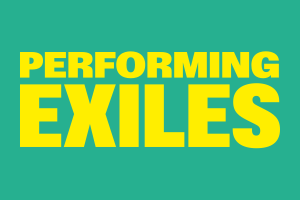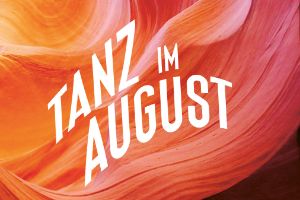

Performing Exiles
15 to 25 June 2023
The interdisciplinary festival “Performing Exiles” examined the concept of exile in the light of continual global changes and multiple migration movements. During the 20th century, Berlin was a place from which people were forced to emigrate – now, however, the city has become a place of the exiled. For most artists, this is not an exile that excludes the option of returning to their home countries. In fact, their spheres of work and points of reference frequently shift between countries and continents.
From the first day of the festival, featuring contemporary positions on the current situations in Lebanon, Iran and Ukraine, the programme clearly demonstrates that circumstances or reasons for exile cannot simply be compounded and compared. Instead, it aims to be a forum for Berlin-based artists, to bring together various scenes and perspectives and to raise the issue of the responsibility of (Berlin’s) cultural institutions for artists who live in the city and consider themselves to be in exile.
The festival programme includes two world premieres created by Berlin-based artists: The Berlin-based internationally renowned film-maker Lemohang Jeremiah Mosese from Lesotho has created his first work for the stage. In “Ancestral Visions of the Future / Pageanty of Wailing” he raises questions of individual and collective identity of a pan-African community and asks how an African consciousness may be manifested within the global diaspora. A performative walking tour curated by director Ada Mukhína, who was born in St Petersburg, takes participants to places of historical and current exile which intertwine with the exile biographies of the three protagonists who guide them through Berlin. The walk “Exile Promenade” compares the cultural heritage of the White émigré in Western European metropoles with the local artistic influences of Russian exiles during Putin’s third presidency, and in particular the emigration since the beginning of war and mobilisation.
Other performances, such as “Hartaqāt” by Lina Majadalanie and Rabih Mroué, “Blind Runner” by Amir Reza Koohestani or “News from the Past” by Stas Zhyrkov refer to current situations in Lebanon, Iran and Ukraine.
“Almost imperceptibly, something has changed in Berlin. Whenever I wanted to have a Zoom-meeting with Lebanese artists during my research for a festival on Lebanon, they would say: “But I’m in Neukölln”. A large proportion of Lebanese artists are living in Berlin. Even ten years ago, many of them preferred a split existence. They would commute between Beirut and Berlin or Paris and Los Angeles. Nowadays, they live almost exclusively in our city. And not only because of the pandemic that has been raging in recent years. After nearly 100 years, Berlin has once again become a capital of the exiled. Many of them are artists who left their countries of origin, often under difficult conditions, because of political oppression, perilous circumstances, observation, censorship or a lack of prospects for the future. Their experiences, perspectives and longings meet in the metropolis, shaping its cultural life.”
Matthias Lilienthal
In Lina Majdalanie’s and Rabih Mroué’s “Hartaqāt (Hérésies)“, the Lebanese authors Rana Issa, Souhaib Ayoub and Bilal Khbeiz tell three stories about the life in Lebanon that they abandoned. The work “Blind Runner” by the Iranian director Amir Reza Koohestani reflects the current situation in Iran as a continuous run against everything. A couple trains for a marathon with the common plan to get through the Channel Tunnel to reach England from France. Even after the training was interrupted by the woman’s arrest one week before the planned departure, the couple do not stop running, but continue it on both sides of the prison walls. In the Ukrainian-German devised play “News from the Past” four actors meet to record a radio feature and ask themselves: How can extreme violence be narrated? How do you evoke suffering – without repeating it?
The festival also sees itself as a structural initiative and connects with international positions. Marlene Monteiro Freitas will present her choreography “idiota”, analysing the theme of Pandora’s Box and addressing questions of death and evil. Her inspiration comes from the works of the Cape Verdean painter Alex Silva (1974–2019) and the mythological character of Pandora. “idiota” is situated within an exhibition context, a performance inside a showcase, inside Pandora’s Box.
In the latest and final part of her trilogy on violence, Brazilian theatre maker Christiane Jatahy, who received the Golden Lion award at the 2022 Venice Biennial for her life’s work, will address the entanglement of racism and capitalism. There seems to have been little change from the times of the transatlantic slave trade to the current policies of the likes of Jair Bolsonaro: There are those who own land, liberty and identity – and those whose existence has no worth.
In addition, there will be three days of discourse with international guests. The programme of “All that is Musical in Us is Memory”, curated by Natasha Ginwala and Magnus Elias Rosengarten, grapples with exile, kinships and (un)belonging. In “Angst, wie wir sie kennen” (Fear as we know it), conceived by Fabian Saul and Senthuran Varatharajah, eight artists explore notions and representations of fear. Eyal Weizman of Forensic Architecture/Forensis and Maksym Rokmaniko from the Center for Spatial Technologies have developed a multi-media lecture that reconstructs the destruction of the Drama Theatre in Mariupol, where thousands of civilians had looked for shelter from the Russian occupiers. Robbie Aitken, Professor of Imperial History at Sheffield’s Hallam University, analyses forms of expression of Black identity and of resistance, using the example of a revue that premiered at Kliems Festsäle in Kreuzberg in 1930.
Another element of the festival programme – which will also be presented at the Academy of the Arts, Berlin, at HAU Hebbel am Ufer, Berlin, and at Heimathafen Neukölln, Berlin – are concerts by “Vesna”, a trio project of the Ukrainian musician Mariana Sadovska and – on the opening day – by the author and singer Serhij Zhadan, who will perform with his ska-band “Zhadan i Sobaky”. The Senegalese curator and multi-disciplinary artist Alibeta will furthermore revive the “Pinguin Bar” after more than 70 years, which during its short-lived existence was a place for jazz, resistance and activism for the Black community in Berlin.
The three-week “School for Dissident Friendship”, a cooperation project with Ashkal Alwan, Beirut, will also take place at the same time, providing networking opportunities to emerging artists from Berlin, Lebanon, Jordan and Egypt and offering them expertise, time and space to continue the development of their own work.
Team
Director and Dramaturgy – Matthias Lilienthal
Curatorial Advice – Rabih Mroué
Assistant to the Director – Sophie Blomen
Trainee Programme – Abdalrahman Alqalaq
Artistic Production Management – Claudia Peters
Production – Philipp Krüger
Production Assistant – Lea Wolf
Organisation Assistant – Carolin Mackert
Administration – Tobias Oettel
Technical Director – Maria Kusche
Communications and Public Relations – Karoline Zinßer
Thank you
Hannah Baumann, Sebastian Baumgarten, Aljoscha Begrich, Ralf Beste, Benjamin Foerster-Baldenius, Prof. Dr. Barbara Gronau, Albrecht Grüß, Nele Hertling, Clara Herrmann, Sophia Hirthammer, Christine Leyerle, Prof. Dr. Nikolaus Müller-Schöll, Andre Schmitz, Dorothee Wenner
